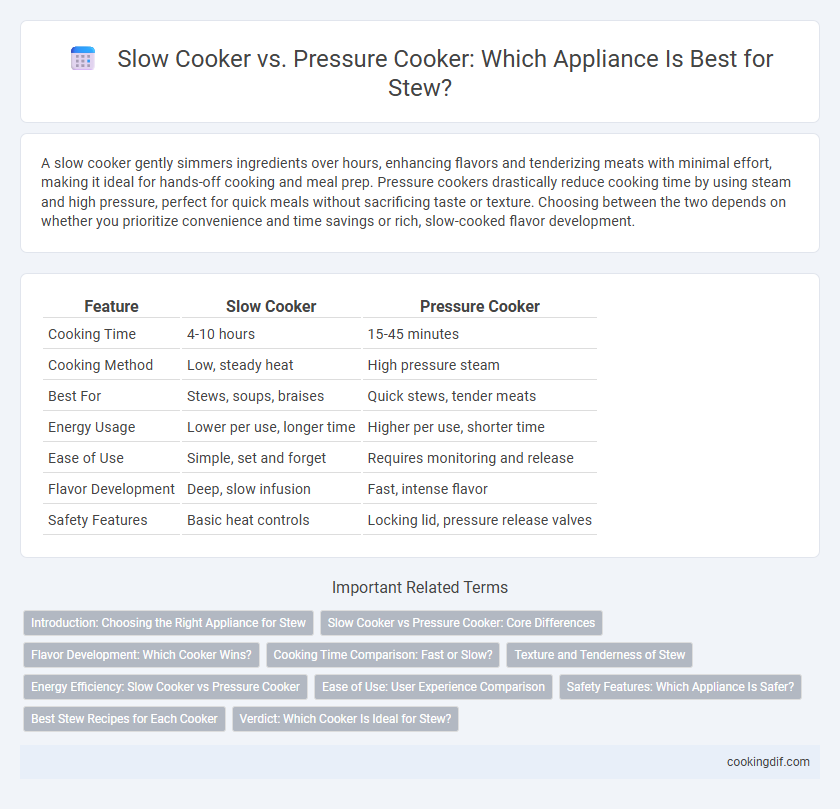A slow cooker gently simmers ingredients over hours, enhancing flavors and tenderizing meats with minimal effort, making it ideal for hands-off cooking and meal prep. Pressure cookers drastically reduce cooking time by using steam and high pressure, perfect for quick meals without sacrificing taste or texture. Choosing between the two depends on whether you prioritize convenience and time savings or rich, slow-cooked flavor development.
Table of Comparison
| Feature | Slow Cooker | Pressure Cooker |
|---|---|---|
| Cooking Time | 4-10 hours | 15-45 minutes |
| Cooking Method | Low, steady heat | High pressure steam |
| Best For | Stews, soups, braises | Quick stews, tender meats |
| Energy Usage | Lower per use, longer time | Higher per use, shorter time |
| Ease of Use | Simple, set and forget | Requires monitoring and release |
| Flavor Development | Deep, slow infusion | Fast, intense flavor |
| Safety Features | Basic heat controls | Locking lid, pressure release valves |
Introduction: Choosing the Right Appliance for Stew
Slow cookers provide a gentle, consistent heat that tenderizes meat and melds flavors over several hours, perfect for traditional stew recipes requiring long, slow cooking. Pressure cookers use high pressure to cook ingredients much faster while retaining nutrients and intensifying flavors, ideal for those needing a quick stew without sacrificing taste. Selecting between these appliances depends on cooking time preferences, flavor development, and nutritional retention priorities.
Slow Cooker vs Pressure Cooker: Core Differences
Slow cookers use low, steady heat over several hours to tenderize meat and meld flavors, ideal for hearty stews and recipes needing long, gentle cooking. Pressure cookers utilize high-pressure steam to significantly reduce cooking time, quickly breaking down tough ingredients while locking in nutrients and intensifying flavors. The core difference lies in slow cookers' lengthy, low-temperature process compared to pressure cookers' rapid, high-pressure technique, affecting texture, taste development, and meal preparation speed.
Flavor Development: Which Cooker Wins?
Slow cookers enhance stew flavor through prolonged, gentle cooking that allows spices and ingredients to meld deeply, creating rich, complex profiles. Pressure cookers develop flavor more quickly by trapping steam and pressure, intensifying taste in a fraction of the time, but may sacrifice some depth compared to slow cooking. For maximum flavor development, slow cookers generally produce a more nuanced, tender stew, while pressure cookers suit those needing fast, flavorful results.
Cooking Time Comparison: Fast or Slow?
Slow cookers typically require 6 to 8 hours to achieve tender, flavorful stew by gently simmering ingredients at low temperatures, preserving textures and depth of taste. Pressure cookers dramatically reduce cooking time to 30-45 minutes by applying high steam pressure, breaking down tough cuts of meat quickly while sealing in moisture and nutrients. Choosing between these appliances depends on whether convenience and speed or slow, enriched flavor development is the priority for stew preparation.
Texture and Tenderness of Stew
Slow cookers excel in creating tender, melt-in-the-mouth stew textures by cooking meat slowly over several hours, allowing connective tissues to break down thoroughly. Pressure cookers achieve similar tenderness much faster by using high pressure and steam, which rapidly softens tough cuts without drying them out. For a stew with rich, deep flavors and consistently tender texture, the choice depends on whether time or slow infusion of flavors is prioritized.
Energy Efficiency: Slow Cooker vs Pressure Cooker
Pressure cookers use up to 70% less energy than slow cookers by reducing cooking time through high-pressure steam, making them more energy-efficient for stews. Slow cookers operate at low heat for extended periods, consuming more electricity over time despite lower wattage. Choosing a pressure cooker can significantly reduce energy consumption while maintaining the rich flavors and tender textures ideal for stews.
Ease of Use: User Experience Comparison
Slow cookers offer a straightforward, hands-off approach ideal for beginners, requiring minimal setup and monitoring, while pressure cookers demand a learning curve due to their precise timing and pressure settings. Slow cookers excel in user-friendly controls with simple knobs or buttons, whereas modern electric pressure cookers incorporate digital interfaces and safety features that enhance ease of use once mastered. Both appliances save time compared to traditional stovetop methods, but slow cookers provide greater convenience for unattended cooking, making them more accessible for everyday users.
Safety Features: Which Appliance Is Safer?
Slow cookers operate at low temperatures over extended periods, minimizing the risk of burns or explosions, making them inherently safer for unattended cooking. Pressure cookers, while faster and efficient, rely on sealed, high-pressure environments that require robust safety mechanisms such as pressure release valves and locking lids to prevent accidents. Advances in modern pressure cooker designs have significantly enhanced safety features, but slow cookers remain the safer choice for users prioritizing worry-free, long-duration cooking.
Best Stew Recipes for Each Cooker
Slow cookers excel at tenderizing tougher cuts of meat over several hours, making them ideal for rich, hearty beef stews that benefit from slow simmering with root vegetables and aromatic herbs. Pressure cookers drastically reduce cooking time by using high pressure, perfect for quickly preparing flavorful chicken stews with tender vegetables while locking in moisture and nutrients. Selecting the right appliance depends on desired cooking speed and texture, with slow cookers delivering deep, melded flavors and pressure cookers offering speedy, savory results without sacrificing taste.
Verdict: Which Cooker Is Ideal for Stew?
A slow cooker excels at developing rich, deep flavors in stew by gently simmering ingredients for hours, making it ideal for tender, well-blended dishes. Pressure cookers drastically reduce cooking time by using high pressure to tenderize meat quickly while preserving nutrients, perfect for busy schedules without sacrificing taste. Choosing between the two depends on whether convenience or flavor depth is the priority, with slow cookers favored for traditional slow-cooked stews and pressure cookers suited for fast preparation.
Slow Cooker vs Pressure Cooker for appliance Infographic

 cookingdif.com
cookingdif.com